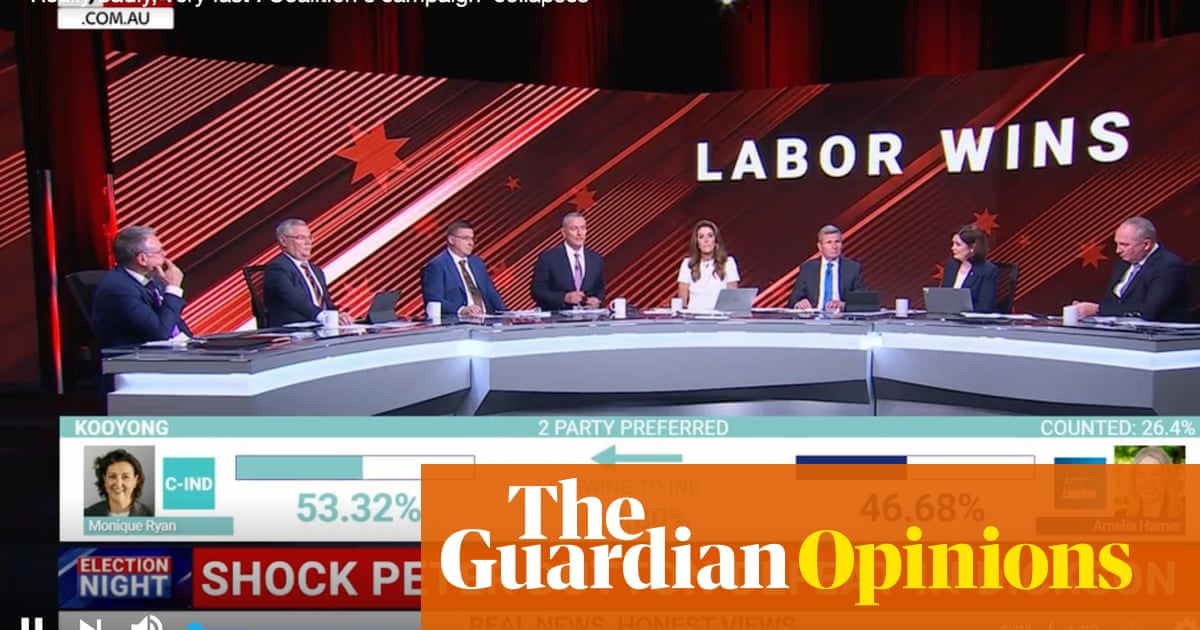It was a result that Andrew Bolt was not expecting and could not countenance.
By 9.46pm the rightwing commentator had penned a piece on the Herald Sun blaming the Australian electorate for theCoalitionloss.
“No, the voters aren’t always right. This time they were wrong,” Bolt wrote.
The reason for the loss? It was because the Liberal party “refused to fight the ‘culture wars’”.
A little over a hour earlier on Sky News Australia, he had recognised it was all over for the Liberal leader that he had dubbed Scary Guy. He was unsentimental about the loss.
Peter Dutton was comprehensively beaten by Anthony Albanese, Bolt said, because everyone agreed the prime minister looked like a “nice easy going guy” compared with Dutton.
Sign up for the Afternoon Update: Election 2025 email newsletter
But that’s where Bolt’s praise for the Labor leader ended. It was incomprehensible, he said, that a government that “left Australians poorer, more divided, more uncertain”, could have been re-elected.
“Well, it did because Anthony Albanese didn’t look threatening,” he said.
“If Peter Dutton does lose in Dickson, they’ve got a leadership crisis. Because there is no person one can say ‘that man is a leader, or that woman is a leader’.”
By the time Dutton’s gracious concession speech was over at 9.39pm, Sky News was calling the election result a “blood bath” and recriminations were flying between Sky’s commentators and their political guests.
Like Bolt, the Sky political editor, Andrew Clennell, pinned the loss on the leader. “People don’t like Peter Dutton,” Clennell said matter of factly as he recounted what happened when he went door knocking. “You know, it’s just one of those unfortunate things.”
For Chris Uhlmann, a former ABC and Nine political editor who has embraced his conservative side over on Sky News, the Coalition’s primary vote is down to a “horrific” 30% and the party is facing “an existential crisis”.
“Where does this party go?” he asked. “This is a party that will tear itself apart while it tries to work out how it articulates itself to appeal to enough people in Australia to be able to form a government in future.”
But shadow minister Sarah Henderson was not conceding defeat. “It’s looking pretty challenging,” she said. “There’s no doubt about that … but there is some green shoots. I like to stay positive. And I want to say that in Solomon, in the Northern Territory, there looks like a very strong swing to the Country Liberal Lisa Bayliss.”
While everyone expressed their surprise at the magnitude of the loss, Clennell suggested the election drubbing was far from a shock to many senior Liberals as Sky producers had struggled to get them on air tonight.
“I just want to take you through how big this is,” Clennell said. The pre-polls can come back, but is Albo about to win a landslide?
“I don’t think there’s any doubt that Albanese has got an increased majority, not just a majority.”
Sky’s election analyst Tom Connell called it not long after 8pm: “This contest is effectively over. Albanese will be prime minister of Australia.”
For much of the night Sky After Dark host Sharri Markson, stationed at Coalition headquarters, was hanging on to the pre-poll results as a path to redemption, predicting that when those results came in the gap between the parties in some seats would narrow.
But it was also Marksonwho recently predictedthe national opinion polls were inaccurate and the Coalition’s private polling was positive: “the polls you’re reading in the news are wrong when it comes to this federal election”.
Peta Credlin, a former chief of staff to Tony Abbott, said it was disgraceful that Dutton had been “demonised” as he was a decent guy. But she came alive when suggesting her side of politics should fight more culture wars. “I’d argue we didn’t do enough of a culture war,” Credlin said.
She went on to suggest the Liberals make a “simple statement” about the rights of biological women, and when she was shouted down by the panel she fired up.
“Again, gentlemen, if you would forgive me, but I’m sick of being mansplained about what biological women feel about biological female rights. We do care about it.”
Former Labor minister Graham Richardson, who hasn’t lost his talent for the one-liner, said the Liberals have got to ask themselves where do we go now?
“We’ve tried Dutton - what else have we got? Well not much because if Angus Taylor is the answer, it’s a stupid question.”
